BNP Paribas
Fabrice Silberzan
Dec 2024
Fabrice Silberzan, head of Industrial Transformation for BNP Paribas’ Securities Services business, talks about how the company’s gradual integration of artificial intelligence and large language models will help benefit its clients
 Image: BNP Paribas
Image: BNP Paribas
How is BNP Paribas integrating AI to transform its Securities Services business and enhance its offering for clients?
Our Securities Services business originated from the concept of dematerialisation. Consequently, it has primarily been built around digital processes, continually striving for automation. Through technology and our engineering expertise, we can handle increasing volumes while enhancing client services. This allows our teams to focus their expertise and knowledge on meaningful client interactions rather than on repetitive manual tasks. For us, the use of artificial intelligence (AI) represents a further advancement in this automation journey.
Given that some of the fundamental aspects of AI have been around for quite some time, what do you think is driving the current momentum and increased use?
Our initial journey with AI began several years ago. Since then, we have developed various AI-based tools that detect anomalies, verify or automate manual inputs, and address other use cases. These tools are now integrated into our operational framework. Furthermore, generative AI is opening new areas of application. This advanced form of AI excels in 'reading' and 'writing' tasks, enabling significant efficiency gains in activities such as processing clients' requests and instructions.
What are some of the issues you face integrating AI into your systems? Are there any significant challenges?
Regarding our existing operational platforms, we use AI to complement our traditional business rules. This allows us to advance further in automation and enhance our control capabilities comprehensively. For our clients, this translates to even more reliable and faster interactions. Additionally, AI enables us to transform unstructured information into data that seamlessly integrates with our processing systems.
Beyond our investments in AI-related technology — in tooling, expertise, and computing capacity — we continue to work on making our traditional systems more open. This openness is crucial for effectively integrating and interacting with AI models.
However, these techniques come with inherent risks, particularly concerning data protection and AI model control. These risks are expected and we continue to manage them diligently.
Given this backdrop, how are you approaching data management and its relation with AI?
Effective data governance is essential for the success of AI projects. Alongside our AI initiatives, we continue to invest heavily in this area. The advanced research capabilities enabled by AI also allow us to offer our clients easier access to our knowledge base and information systems.
As part of this effort, we have developed NOA, a virtual agent that uses traditional AI techniques, which is available to clients through the latest generation of our NeoLink client portal. We will continue to prioritise these efforts, focusing on information accessibility and increasingly seamless digital experiences.
How do you assess the growing need for new resources and additional partnerships in continuing to develop these technologies?
We benefit from the investment power of the BNP Paribas Group and its partnerships, such as the recent agreement with Mistral AI.
Given the cost of accessing these technologies, we continue to deploy them in a controlled and rigorous manner. In addition, as these technologies require powerful computing engines, we aim to optimise the size of the models used, which is particularly crucial for the large language models (LLMs) of generative AI.
Which role may AI serve in the growing arena of unlisted assets?
The universe of funds, particularly debt funds and unlisted assets, is largely unstandardised. AI, and generative AI are well-suited to this context.
These technologies will be crucial drivers of transformation in these areas. Many use cases are being developed, ranging from the analysis of prospectuses and information notices to subsequent controls, valuation, and payments — some of which are already in production for our Securities Services business.
In conclusion, AI, encompassing generative AI and large language models, is increasingly becoming integral to our processes and services.
We are confident that the progression of AI aligns perfectly with our primary goal of providing our clients with superior quality, control, and competitiveness.
← Previous interview
STP Investment Services
David Goldstein
Next interview →
Pictet Asset Services
Claude Pech and Rob Lowe
 Image: BNP Paribas
Image: BNP Paribas 